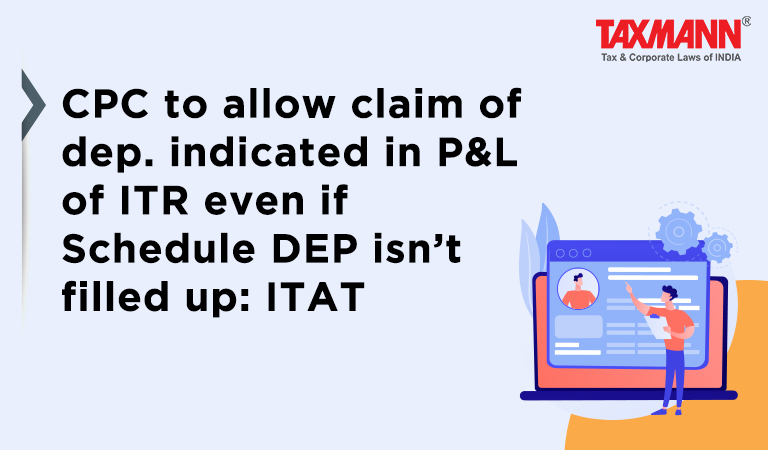CPC to allow claim of dep. indicated in P&L of ITR even if Schedule DEP isn’t filled up: ITAT
- Blog|News|Income Tax|
- 2 Min Read
- By Taxmann
- |
- Last Updated on 2 November, 2022

Case Details: Indauto Filters Vs the Assistant Director of Income Tax - [2022] 144 taxmann.com 3 (Bangalore-Trib.)
Judiciary and Counsel Details
-
- N. V. Vasudevan, Vice-President & Ms. Padmavathy S, Accountant Member
- K.G. Acharya, CA for the Appellant.
- K.R. Narayana, Addl. CIT (DR) for the Respondent.
Facts of the Case
The assessee was a partnership firm. In the return of income, it inadvertently failed to feed the details of depreciation in Schedule- DEP and Part BP- Computation of income from Business or Profession but submitted the same correctly in “Part A- P&L”. Assessee received an intimation under section 143(1) wherein claim for depreciation was disallowed and the amount was added as the income from business or profession.
The aggrieved Assessee filed an appeal to CIT (A) which was dismissed. The matter reached the Bangalore Tribunal.
ITAT Held
The Tribunal has emphasized Explanation 5 to section 32 wherein it was stated that the claim for depreciation is allowed irrespective of the fact that the assessee has claimed the deduction for depreciation in the computation of total income.
The fact that the depreciation was correctly disclosed in “Part A- P&L” and the Tax Audit Reports, also supports the contention of the assessee that the depreciation was inadvertently omitted while filing ITR.
Further, the Assessing Officer is also duty-bound to grant the depreciation allowance if the conditions mentioned in Section 32 have been complied with irrespective of the fact that the same is claimed by the assessee or not.
Thus, in the instant case, the assessee should be allowed the claim of depreciation under section 32.
Disclaimer: The content/information published on the website is only for general information of the user and shall not be construed as legal advice. While the Taxmann has exercised reasonable efforts to ensure the veracity of information/content published, Taxmann shall be under no liability in any manner whatsoever for incorrect information, if any.

Taxmann Publications has a dedicated in-house Research & Editorial Team. This team consists of a team of Chartered Accountants, Company Secretaries, and Lawyers. This team works under the guidance and supervision of editor-in-chief Mr Rakesh Bhargava.
The Research and Editorial Team is responsible for developing reliable and accurate content for the readers. The team follows the six-sigma approach to achieve the benchmark of zero error in its publications and research platforms. The team ensures that the following publication guidelines are thoroughly followed while developing the content:
- The statutory material is obtained only from the authorized and reliable sources
- All the latest developments in the judicial and legislative fields are covered
- Prepare the analytical write-ups on current, controversial, and important issues to help the readers to understand the concept and its implications
- Every content published by Taxmann is complete, accurate and lucid
- All evidence-based statements are supported with proper reference to Section, Circular No., Notification No. or citations
- The golden rules of grammar, style and consistency are thoroughly followed
- Font and size that’s easy to read and remain consistent across all imprint and digital publications are applied



 CA | CS | CMA
CA | CS | CMA
